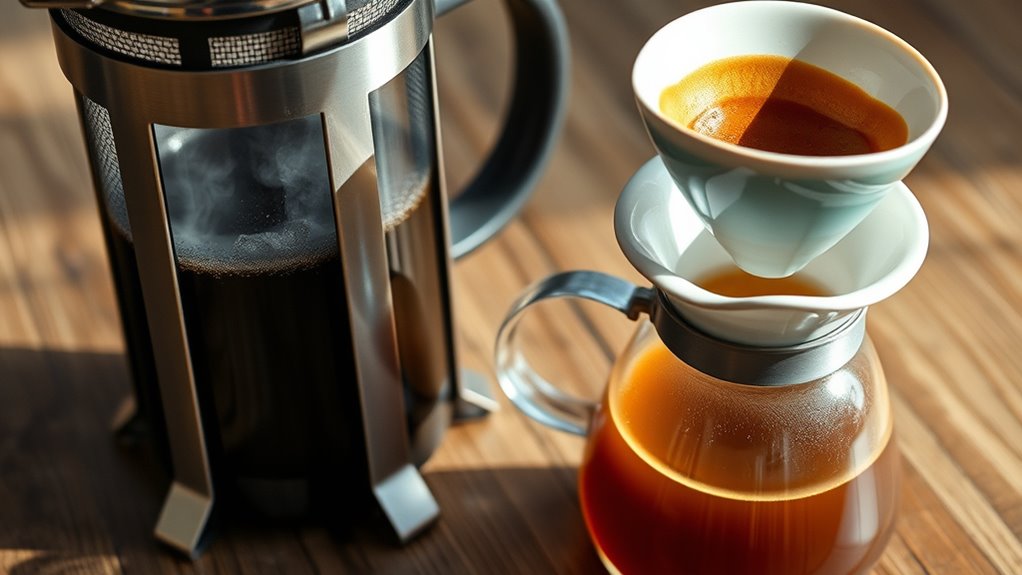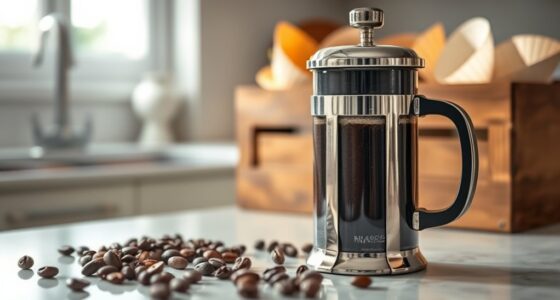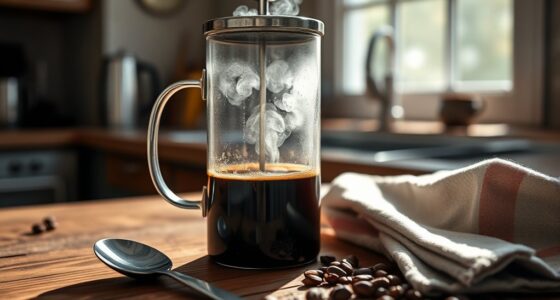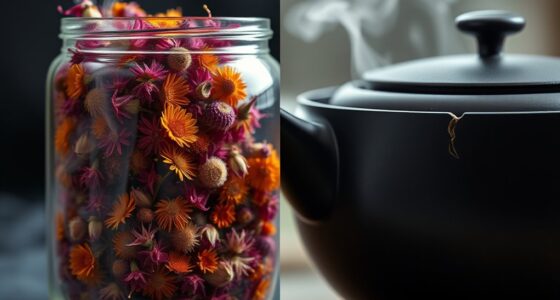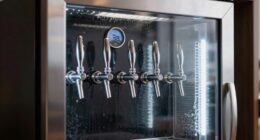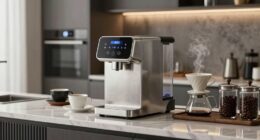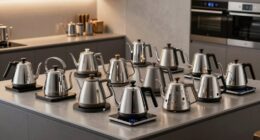The French Press offers a full-bodied, rich brew by immersing grounds directly in water, preserving oils and sediment for a robust flavor. It gives you more control over brewing time and strength but requires attention to grind size and steeping duration. In contrast, drip machines and pour-over methods produce cleaner, lighter cups more quickly but with less customization. Understanding these differences helps you find the perfect method; keep exploring to uncover more about what suits your taste best.
Key Takeaways
- French Press extracts more oils and sediment for a richer, fuller-bodied coffee compared to cleaner brews from drip or pour-over methods.
- It offers greater control over brewing time and strength, unlike automated systems that prioritize speed and convenience.
- The metal mesh filter retains beneficial oils and antioxidants, enhancing flavor complexity and health benefits over paper-filtered brews.
- French Press requires manual attention and precise grind size, whereas drip and capsule machines are more automated and user-friendly.
- The full immersion process results in a thicker, more robust cup, while other methods produce lighter, cleaner-tasting coffee.

When it comes to brewing coffee, the French Press stands out for its ability to produce a full-bodied, robust cup that retains oils and sediment, unlike drip machines which yield a cleaner, lighter brew thanks to paper filters. This method falls under immersion brewing, where coffee grounds steep directly in hot water, allowing for thorough extraction.
The result is a rich flavor profile with pronounced depth and a thicker texture that many coffee enthusiasts prefer. The key to achieving this lies in the filter type: a metal mesh filter that preserves coffee oils and antioxidants, which contribute to the bold taste and health benefits. Unlike paper filters in drip machines, this filter lets oils stay in the brew, enhancing flavor complexity.
Using a French Press requires specific grind size and brewing time. You need coarser grounds because finer grinds can slip through the mesh filter, leading to over-extraction and a gritty texture. The brewing process itself takes longer—usually about four minutes—giving the coffee ample time to fully extract the desirable flavors.
This contrasts with other brewing methods like drip machines or pour-over, which often focus on speed and convenience. While those methods typically use paper filters that remove oils, resulting in a cleaner, lighter cup, the French Press emphasizes richness and body.
Compared to pour-over, the French Press offers more control over brewing variables such as steeping time and strength. You can adjust the immersion duration to influence extraction levels and flavor intensity, making it more customizable than automatic drip systems. However, this means it also demands more attention and patience.
Equipment-wise, the French Press is simple and requires minimal setup—just the press, coffee grounds, hot water, and a few minutes. In contrast, drip machines or capsule brewers are designed for speed and ease but sacrifice some flavor depth because they use paper filters and shorter contact times.
Additionally, the filtration method of the French Press allows more oils and suspended solids to remain in the brew, which contributes to its rich texture and flavor profile.
Frequently Asked Questions
What Are the Disadvantages of French Press?
You should know that using a French press has some disadvantages. You might end up with sediment and grounds in your cup if you don’t filter properly.
The metal filter lets oils and tiny particles through, making your coffee grittier. Cleaning can be a hassle, especially with stubborn oils and residues.
Plus, the fragile glass or metal materials can break easily, and over-extraction from fine grounds can cause bitterness.
What Is the Healthiest Method of Coffee Making?
The healthiest coffee-making method depends on your health goals.
If you’re concerned about cholesterol, filtered methods like drip or pour-over are better because they remove oils and compounds linked to raising LDL levels. These methods also preserve antioxidants, supporting overall health.
However, if you want more antioxidants and aren’t worried about cholesterol, a French Press can be beneficial.
Choose based on your specific health needs and preferences.
What Is Better, Pour Over or French Press?
When choosing between pour-over and French press, it really depends on what you prefer.
If you want a cleaner, brighter cup with subtle flavors, pour-over is better because of its precision and clarity.
But if you enjoy a bold, full-bodied brew with richer textures and oils, then French press suits you more.
Consider your taste preference for clarity versus richness, and pick the method that aligns with your coffee experience.
Is Drip Coffee or French Press Better?
When choosing between drip coffee and French press, it depends on what you prefer.
If you want a quick, clean cup with subtle flavors, drip coffee is your best choice.
But if you enjoy a bold, full-bodied brew with richer oils and sediments, then the French press suits you better.
Consider your taste and time, and pick the method that matches your morning routine and flavor preferences.
Conclusion
Ultimately, choosing a French press or other brewing methods depends on your taste and lifestyle. A French press offers rich, full-bodied flavor and simplicity, but it requires more cleaning. Other methods like drip or pour-over may be quicker and cleaner, yet might lack the boldness you get from a press. Consider what matters most—flavor, convenience, or clean-up—and pick the method that best fits your coffee routine.
